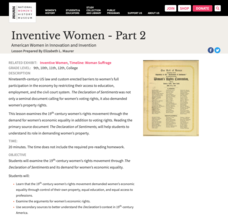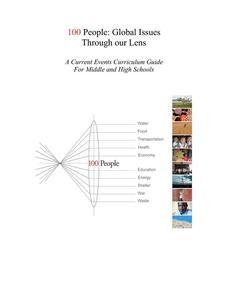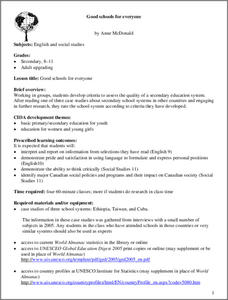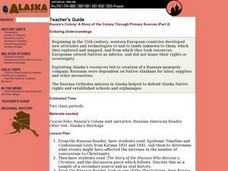Albert Shanker Institute
Dream Under Development
As part of their study of the 1963 March on Washington, class members do a side-by-side comparison of the original text of Martin Luther King's "I Have a Dream Speech" with a transcript of the speech he delivered. The take away from the...
National Woman's History Museum
Inventive Women - Part 2
The Declaration of Independence was published in 1776. The Declaration of Sentiments and Resolutions, modeled after the Declaration of Independence, was drafted and read by Elizabeth Cady Stanton at the Seneca Falls Convention in 1848....
National Park Service
Living & Non-Living Interactions
What better way to learn about ecosystems than by getting outside and observing them first hand? Accompanying a field trip to a local park or outdoor space, this series of collaborative activities engages children in learning about the...
Curated OER
Personalities of the Renaissance
Have the class interpret historical evidence presented in primary and secondary resources. They examine sources regarding architecture, art, exploration, government, literature, religion, and technology of the era. Then they use their...
Curated OER
Nonfiction Text: Comprehension Practice
A New York Times article about a 15-year-old style maven who in 2011 launched the fashion magazine "Rookie," based on her blog, makes high-interest nonfiction reading for secondary learners. This page asks 9 comprehension questions...
Made by Educators
Sociological Methods
First year undergraduate sociology students can prepare for their exams with an application that provides practice questions in six categories: Quantitative and Qualitative Data, Sources of Data, Primary and Secondary Data, Positivism...
National Endowment for the Humanities
James Madison: Madison Was There
Madison was there! Scholars go on a journey to discover the person behind the founding father label as they explore James Madison's role in the formation of the United States government. The culmination is a writing assignment and...
100 People Foundation
100 People: Global Issues Through Our Lens
If the world were 100 people...17 would not have access to safe drinking water, 18 would not be able to read or write, and 52 would not have a primary education. Using the theme of "100 people," this resource explores other major issues...
Curated OER
Good Schools For Everyone
Students work in groups in order to brainstorm the type of criteria needed to assess the quality of a secondary school. They use several case studies to establish the context for coming up with ideas. Then students conduct research into...
Curated OER
Russia's Colony: A Story of the Colony Through Primary Sources
Students read "Epidemic Timeline and Confessional Lists from Katmai 1831 and 1845." They construct a picture of life in Alaska during the Russian period.
Curated OER
Stories of the Wrights' Flight
Pupils examine and compare primary and secondary source accounts of the Wright brothers' first flights on December 17, 1903.
Curated OER
The Significant Contributions of Islamic Women to the Growth and Expansion of Islamic Civilization
Students read and explore the historical evidence that supports the viewpoint that Islamic women have made significant and lasting contributions to Islamic Civilization. They read and analyze secondary and primary sources relevant to...
Curated OER
Giving Voice to History
Students examine the plight of Japanese Americans during World War II. In this World War II lesson, students participate in a mock evocation simulation, research primary and secondary documents about internment camps, and share their...
Curated OER
Canada and its Trading Partners
Students identify the relationship between Canada and its trading partners. They use two data sources, Canadian Statistics and E-STAT, on the Statistics Canada website to explore the growing importance of trade in general.
Curated OER
Diversity of Colors
Students investigate color diversity by experimenting with jelly beans. For this color spectrum lesson, students observe colored jelly beans through different filters and light sources to change the existing look of the bean. Students...
Curated OER
Baseball, Race Relations and Jackie Robinson
Learners interpret historical evidence presented in primary and secondary resources. In this race relations lesson, students discover details about how Jackie Robinson broke the racial barrier in professional baseball.
Curated OER
George Washington: First in War, First in Peace, and First in the Hearts of His Countrymen
Learners interpret historical evidence presented in primary and secondary resources. In this George Washington lesson plan, students research the details of Washington's military successes, his role at the Constitutional Convention, and...
Curated OER
Meet the Press: American Presidents
Students interpret historical evidence presented in primary and secondary resources. In this presidential history lesson, students research the accomplishments of George Washington, Abraham Lincoln, Frankiln D. Roosevelt, and Barack...
Curated OER
Border History
High schoolers research primary sources to construct an outline of a border city's history.
Curated OER
Exploring Archaeology and Trade in the Middle School Latin Class
Students in a Latin class focus on archeology and trade from the Hellenistic period through the Middle Ages. In groups, they read various stages of a primary source documents in which they discuss and answer questions. To end the lesson,...
Curated OER
NUMB3RS Activity: Regular Ploygon Centroids
Students investigate geo-profiling. In this secondary mathematics activity, students use geo-profiling to determine the most probable location of a criminal. Students find the centroid of a polygon where the vertices represent crime...
Curated OER
Understanding Reconstruction in South Carolina
Eighth graders interpret historical evidence presented in primary and secondary resources. In this Reconstruction lesson, 8th graders research the role of Reconstruction in South Carolina by simulating the environment of East Bay Street...
Curated OER
Building a Memorial to the Underground Railroad
Students interpret historical evidence presented in primary and secondary resources. In this Underground Railroad activity, students examine the attributes and function of the Underground Railroad in order to...
Curated OER
Farm to Lunch: Exploring Agricultural Careers
Fourth graders examine Utah's economic structure and learn about agricultural careers. In this agricultural careers lesson, 4th graders follow agricultural products from their source to the lunch table. Students chart their results to...
Other popular searches
- Primary and Secondary Sources
- Primary Secondary Sources
- Primary vs Secondary Sources
- Primary & Secondary Sources
- Primary, Secondary Sources
- Teaching Secondary Sources
- Primary vs. Secondary Sources

























